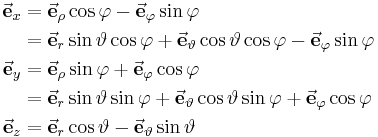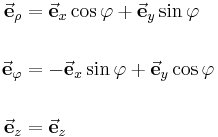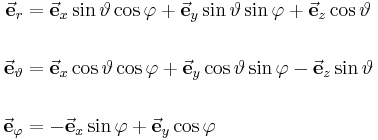Formelsammlung Koordinatensysteme: Unterschied zwischen den Versionen
Aus GET A
| Zeile 60: | Zeile 60: | ||
<math>\begin{align} | <math>\begin{align} | ||
\vec{\mathbf{e}}_x &= \vec{\mathbf{e}}_{\rho}\cos{\varphi}-\vec{\mathbf{e}}_{\varphi}\sin{\varphi}\\ | \vec{\mathbf{e}}_x &= \vec{\mathbf{e}}_{\rho}\cos{\varphi}-\vec{\mathbf{e}}_{\varphi}\sin{\varphi}\\ | ||
| − | &= \vec{\mathbf{e}}_r\sin{\vartheta}\cos{\varphi}+\vec{\mathbf{e}}_{\vartheta} \cos{vartheta} \cos{\varphi}-\vec{\mathbf{e}}_{\varphi}\sin{\varphi}\\ | + | &= \vec{\mathbf{e}}_r\sin{\vartheta}\cos{\varphi}+\vec{\mathbf{e}}_{\vartheta} \cos{\vartheta} \cos{\varphi}-\vec{\mathbf{e}}_{\varphi}\sin{\varphi}\\ |
\vec{\mathbf{e}}_y &= \vec{\mathbf{e}}_{\rho}\sin{\varphi}+\vec{\mathbf{e}}_{\varphi}\cos{\varphi}\\ | \vec{\mathbf{e}}_y &= \vec{\mathbf{e}}_{\rho}\sin{\varphi}+\vec{\mathbf{e}}_{\varphi}\cos{\varphi}\\ | ||
| − | &= \vec{\mathbf{e}}_r\sin{\vartheta}\sin{\varphi}+\vec{\mathbf{e}}_{\vartheta}\cos{vartheta}\sin{\varphi}+\vec{\mathbf{e}}_{\varphi}\cos{\varphi}\\ | + | &= \vec{\mathbf{e}}_r\sin{\vartheta}\sin{\varphi}+\vec{\mathbf{e}}_{\vartheta}\cos{\vartheta}\sin{\varphi}+\vec{\mathbf{e}}_{\varphi}\cos{\varphi}\\ |
\vec{\mathbf{e}}_z &= \vec{\mathbf{e}}_r\cos{\vartheta}-\vec{\mathbf{e}}_{\vartheta}\sin{\vartheta}\\ | \vec{\mathbf{e}}_z &= \vec{\mathbf{e}}_r\cos{\vartheta}-\vec{\mathbf{e}}_{\vartheta}\sin{\vartheta}\\ | ||
\end{align}</math> | \end{align}</math> | ||
| − | |||
|style="background-color:#dde6f3;text-align:center;"| | |style="background-color:#dde6f3;text-align:center;"| | ||
| + | <math>\begin{align}\vec{\mathbf{e}}_{\rho} &= \vec{\mathbf{e}}_x\cos{\varphi}+\vec{\mathbf{e}}_y\sin{\varphi}\\ | ||
| + | \\ | ||
| + | \vec{\mathbf{e}}_{\varphi} &= -\vec{\mathbf{e}}_x\sin{\varphi}+\vec{\mathbf{e}}_y\cos{\varphi}\\ | ||
| + | \\ | ||
| + | \vec{\mathbf{e}}_z &= \vec{\mathbf{e}}_z | ||
| + | \end{align}</math> | ||
|style="background-color:#c9d7ec;text-align:center;"| | |style="background-color:#c9d7ec;text-align:center;"| | ||
| − | + | <math>\begin{align}\vec{\mathbf{e}}_r &= \vec{\mathbf{e}}_x\sin{\vartheta}\cos{\varphi}+\vec{\mathbf{e}}_y\sin{\vartheta} \sin{\varphi}+\vec{\mathbf{e}}_z\cos{\vartheta}\\ | |
| − | + | \\ | |
| + | \vec{\mathbf{e}}_{\vartheta} &= \vec{\mathbf{e}}_x\cos{\vartheta}\cos{\varphi}+\vec{\mathbf{e}}_y\cos{\vartheta}\sin{\varphi}-\vec{\mathbf{e}}_z\sin{\vartheta}\\ | ||
| + | \\ | ||
| + | \vec{\mathbf{e}}_{\varphi} &= -\vec{\mathbf{e}}_x\sin{\varphi}+\vec{\mathbf{e}}_y\cos{\varphi} | ||
| + | \end{align}</math> | ||
|- | |- | ||
|style="background-color:#dde6f3"|Ortsvektor | |style="background-color:#dde6f3"|Ortsvektor | ||
Version vom 28. August 2012, 10:55 Uhr
| Einheitsvektoren |
|
|
|
|
|
\quad
|
| |
|
Zusammenhang mit den kartesischen Koordinaten |
|
| |
| Umrechnungen |
|
|
|
| Ortsvektor | |||
| Betrag des Ortsvektors | |||
| vektorielles Wegelement | |||
| Volumenelement | |||
| vektorielles Flächenelement |










